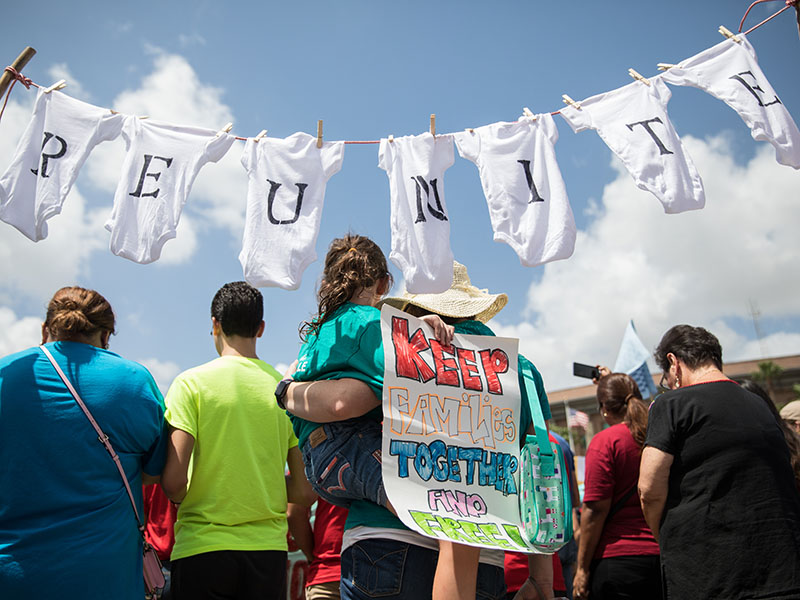Being an Immigration Attorney in the Age of Trump
By Gabe Cahn, HIAS.org
Jul 09, 2018

Demonstrators rally against the Trump administration's immigration policies in Linear Park near the federal courthouse in Brownsville, Texas, on June 28, 2018.
(Tamir Kalifa/Getty Images)
The e-mail arrived on April 6, 2018 with “Urgent SIJS Case (Help Needed!)” in the subject line—just the kind of case Héctor Rojas Olivo, HIAS’ newest immigration staff attorney, likes to take on.
Monica, a detained, soon-to-be 21-year-old transgender woman in New Mexico, had 20 days until she would become too old to be eligible for Special Immigrant Juvenile Status (SIJS). SIJS is a form of relief for minors currently in the United States to become Lawful Permanent Residents, even if their entry into the United States was unauthorized.
For eligible minors, immigration attorneys will often petition for SIJS at the same time they file for asylum, as a way to increase the likelihood of protection.
Given her life story of repeated abuse and sexual trafficking by family members, it was clearly in Monica’s best interests to not be returned to Honduras, her country of origin and where her parents currently live. One of the problems, however, was that Monica was in immigration detention in New Mexico and running out of time, and Héctor was in New York, where the courts didn’t have jurisdiction to weigh in.
In order to petition for her release, Héctor needed to get a guardianship order and a special finding order from the New York State Family Court, showing that the child is: under 21, not married, has been declared dependent on a juvenile court, that reunification with one or both of the child’s parents is not viable due to abuse, neglect, abandonment, or a similar basis under state law; and that it is not in the child’s best interest to be returned to his or her country of nationality or last residence. 8 U.S.C.§ 1101(a)(27)(J).
So, in one of his last cases at Catholic Migration Services before joining HIAS, Héctor was able to persuade a judge that the Brooklyn Family Court had jurisdiction over Monica’s case because her backpack and other personal belongings were in Brooklyn, where she had lived before being detained, and where her proposed guardian lived.
In the remarkable opinion from the Brooklyn Family Court published on May 17, 2018, the judge wrote that while Monica’s property did not “consist of real estate property, substantial assets or any significant monetary property,” her personal items constituted her “only ‘property’ in the world!” And therefore, the fact that Monica’s property is “de minimis,” or legally trivial, that fact “should not stymie her jurisdictional right to pursue her Guardianship proceeding” in New York. Matter of Christian J.C.U. v Jorge R.C., 2018 NY Slip Op 28159.
“For anyone who practices immigration law, and in particular Special Immigrant Juvenile Status, this case shows the power of creative, rebellious lawyering,” said Megan Jordi Brody, HIAS’ managing attorney.
“In this new world of immigration law,” she continued, “attorneys are having to make some really creative arguments on behalf of their minor clients.”
Once Héctor was able to establish jurisdiction for Monica in New York, he was then able to rush to expedite the guardianship petition and obtain the special finding order in time to file a petition for SIJS—just a couple of days before Monica aged out of eligibility on April 26.
And though Monica’s asylum application was eventually granted a few weeks after the family court ruling, Héctor expects his legal maneuvering around SIJS to be replicated, especially in New York, which is one of the few jurisdictions where you can obtain guardianship for someone who is over the age of 18.
Still, given the barriers to safety faced by many asylum seekers, Héctor worries that vulnerable clients may give up seeking protection through legal system altogether and go back to their home countries where they risk death.
“Some clients come with no formal education,” he says. “They are traumatized. They don’t even know they need an attorney. Sometimes they don’t even know how to articulate that they’re escaping persecution.”
“Most of these cases have stories that may never be told, and that is the saddest part to me.”
To learn more about HIAS’ work advocating for and protecting asylum seekers, click here.